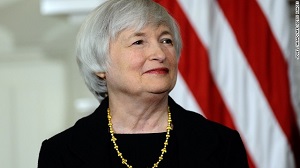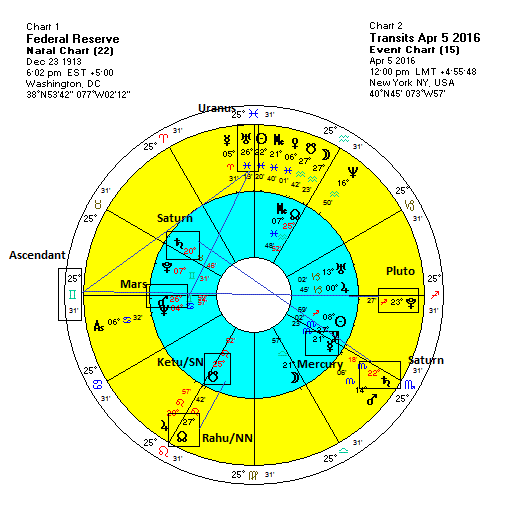 (4 April 2016) Fed Chair Janet Yellen is definitely living up to her reputation as a Keynesian inflation "dove". After keeping interest rates unchanged at the last Fed meeting in -mid-March, Ms. Yellen last week essentially precluded any early rate hikes as she cited continued global uncertainty, especially in China. Despite an improving US economy and a domestic inflation rate that is now pushing up against that important 2% threshold, Yellen and the Fed are increasingly reluctant to raise rates lest it cause more global fallout. The Fed’s long-awaited hike in December sparked a big global sell-off in stocks and that may have forced Yellen to re-think her plan to normalize rates. It seems she is willing to accept a higher rate of US inflation in order to keep the status quo intact.
(4 April 2016) Fed Chair Janet Yellen is definitely living up to her reputation as a Keynesian inflation "dove". After keeping interest rates unchanged at the last Fed meeting in -mid-March, Ms. Yellen last week essentially precluded any early rate hikes as she cited continued global uncertainty, especially in China. Despite an improving US economy and a domestic inflation rate that is now pushing up against that important 2% threshold, Yellen and the Fed are increasingly reluctant to raise rates lest it cause more global fallout. The Fed’s long-awaited hike in December sparked a big global sell-off in stocks and that may have forced Yellen to re-think her plan to normalize rates. It seems she is willing to accept a higher rate of US inflation in order to keep the status quo intact.
Despite Yellen’s confident reassurances, more commentators now see the Fed as being trapped in its low interest rate policy. The Fed may want to raise rates to combat rising inflation but it is increasingly beholden to stock markets both in the US and around the world. Since the Fed emphasizes the link between a buoyant stock market and economic growth, it is reluctant to do anything that would cause stocks to fall. As a result, the Fed may never be able to normalize rates in the current environment since any attempt to do so could cause a massive global stock market sell-off.
So is there a downside for the Fed to keep rates near zero indefinitely? If the current low-growth environment continues, then things could go on as is for a while without too much damage. But if there is another deflationary crisis originating out of China or Europe, then the Fed would have to go to negative interest rates. Such a move may well be theoretically stimulative for the economy, but it would likely frighten markets. Conversely, if US inflation continues to rise and exceeds 2%, then the bond market would likely be the first to blink as yields would begin to rise. Rising yields is the last thing the Fed wants since it is trying to encourage banks to lend more, so the Fed would be forced finally to raise rates.

The horoscope of the Federal Reserve (Dec 23 1913, 6.02 p.m.) reflects this growing stress. We see that transiting Saturn (obstacles, disappointment) is in a close conjunction with Mercury (communication, rationality) over the past several weeks. For an additional sense of frustration, Saturn is now also opposite its natal position. Saturn is forcing the Fed into making very difficult and onerous decisions. Markets are also more aware of the Fed’s conundrum now as Yellen allows inflation to rise to a potentially troublesome level. Analysts now realize that central banks have limits (Saturn) and can only do so much to fix the economy. Questions are also being raised about how the Fed is now acting beyond its mandate, which was supposedly focused only on keeping inflation low and promoting full employment. With Saturn now retrograde, it is moving very slowly so I would expect the Fed’s credibility problems to continue and even intensify in the coming weeks. These problems may be the result of new financial challenges for global markets and the growing perception that it is trapped and ‘out of bullets’.
But the Fed’s horoscope has other afflictions also. Transiting Rahu has been conjunct natal Ketu since February and this is another reason for its state of uncertainty. These nodal (i.e. Rahu and Ketu) contacts are classic indicators of instability and change. No doubt Yellen had to give up her hope for more rate increases for 2016 given the sell-off after December and all the slowdown and devaluation talk surrounding China. The Lunar Nodes move slowly so this affliction isn’t over yet. It should continue through April and into May. It may mean that the Fed will struggle to stay ahead of quickly changing circumstances in the world economy. It may also mean that there will be more questions about its ability to deal with economic problems.
Of course, afflictions to the Fed horoscope are only an indirect influence on financial markets. It is possible that stocks could remain relatively strong through this April and May period during the Rahu-Ketu conjunction and the Saturn conjunction to Mercury. However, I would think that any trouble at the Fed is probably not good news for stock markets, all other things being equal.
The longer term influences don’t look much better as the Uranus-Pluto square remains within range of the Ascendant-Mars conjunction in the Fed horoscope. This speaks to severe disruptions and shocks to the system over the next year at least. Uranus stations at 0 Aries in July and then comes back to square the natal Mars in December of 2016. This is a troublesome influence that suggests sudden changes that upset the status quo. Pluto moves more slowly so it will not exactly oppose the Ascendant-Mars pairing until 2018. It also looks like bad news for the Federal Reserve and hints at power plays and coercion in which the Fed gets the short end of the stick. This could symbolize a few different things such as a damning audit of the Fed from Congress, or perhaps a nasty currency war with China that forces Yellen’s hand to raise rates. And if China sold its considerable holdings of US Treasuries, it would force US rates much higher.
Weekly Market Forecast
US stocks were generally higher last week following those dovish comments by Janet Yellen as the Dow rose more than 1% to 17,792. Indian stocks were mostly flat as investors prepared for the latest policy announcement by the RBI. The Sensex was slightly lower on the week to 25,269.
The resilience of most markets has been a little surprising following the recent Saturn retrograde station (March 25) and lunar eclipse (March 23). I thought we might have seen more in the way of caution and uncertainty in light of these potentially destabilizing influences. To be sure, most European and Asian markets have been weaker since these late March celestial phenomena but the US market has so far remained unaffected.
Stocks were mixed on Monday with a modest decline in New York. Tuesday’s Sun-Saturn alignment may also depress sentiment although perhaps not by much. The most interesting alignment this week involves Mercury and Venus. Both of these planets are considered positive so their 30 degree alignment is nominally bullish. This alignment is closest Tuesday and Wednesday. However, some of this positivity may be lost since both Mercury and Venus are associated with Saturn through a lesser 15 degree angle (N.B. 15 degrees is also a divisor of 360 degrees). Saturn is often bearish and its presence in this alignment may limit gains. The late week Sun-Uranus conjunction looks more bullish. Overall, it’s a very mixed picture and I do not have a strong opinion about where stocks will finish this week. But as Mars edges closer to its retrograde station on 17th April, I would think optimism may be in shorter supply. Mars will station at 14 Scorpio, just 7 degrees away from Saturn at 21 Scorpio. Both malefic planets will then move backward in tandem through Scorpio. It’s hard to see stocks rallying against this heavy Scorpionic influence.
For more details and analysis on market trends for this week, this month and this year, please check out my weekly MVA Investor Newsletter. The newsletter includes discussion of US and Indian stock markets, as well as gold, oil and major currencies.
These weekly forecasts are usually posted every Monday.
You can be notified of new posts if you follow ModernVedAstro on Twitter.
Please note that this is a more general and much abbreviated free version of my
investor newsletter which can be subscribed to here.
Please read my Disclaimer
Market forecast for week of 14 March 2016
Market forecast for week of 7 March 2016
Market forecast for week of 29 February 2016
Market forecast for week of 22 February 2016
Market forecast for week of 15 February 2016
Market forecast for week of 8 February 2016
Market forecast for week of 1 February 2016
Market forecast for week of 25 January 2016
Market forecast for week of 18 January 2016
Market forecast for week of 11 January 2016
Market forecast for week of 4 January 2016
Market forecast for week of 28 December 2015
Market forecast for week of 21 December 2015
Market forecast for week of 14 December 2015
Market forecast for week of 7 December 2015
Market forecast for week of 30 November 2015
Market forecast for week of 16 November 2015


